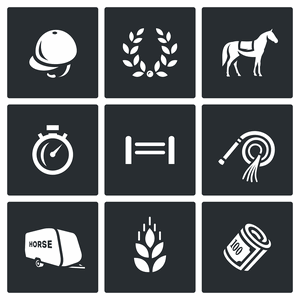 Horse Racing is one of those sports that once you know how it works it becomes exceptionally fun to bet on and watch. The problem is many of the terminologies and betting systems are stuck in the past and this makes getting over the first hurdle a hassle.
Horse Racing is one of those sports that once you know how it works it becomes exceptionally fun to bet on and watch. The problem is many of the terminologies and betting systems are stuck in the past and this makes getting over the first hurdle a hassle.
On this page we aim to give you all of the tools and knowledge to help you bet on horse racing. Don’t get caught out by Rule 4, make sure you know your racing grades, be in the know about best odds guarantees and much more.
More general betting guides see our main articles page.
Horse Racing Grades Explained

There are more grades in horse racing than a school exam but there isn’t anything particularly complicated about them. Grade classifications differ between flat and National Hunt jump racing but the principle is the same, the higher you move up the higher quality the racing is. Top grade horse races are the most prestigious and carry the best payouts and offers.
Rule 4 Explained

Rule 4 is the industry standard method used by high street bookmakers and online betting sites to adjust the odds of a race if a horse is withdrawn after the final order has been declared. The effect on the odds is dependent on the price of the withdrawn horse and the size of the field, find out what effect this might have on your bet.
Tote and Totepool Betting Guide
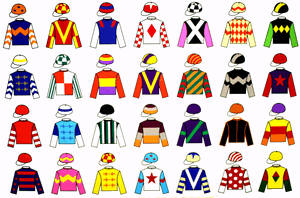
The Tote was originally created as a means for the government to gain some control of licensed gambling at horse and greyhound tracks. It is a form of pari-mutuel betting which means stakes are pooled and winners win a share of the pot rather than a set amount as with fixed odds betting. Find out how to bet on tote and totepool.
Longest Horse Races
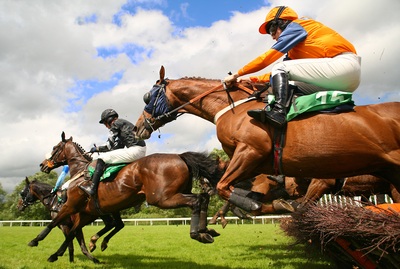
There are scores of different types of horse races for different types of horses, and most don’t last all that long. But which are the longest of them all requiring the most stamina from the horses and the most focus from the jockey? You might find a few surprises in here, too.
How Are Race Horses Bred?
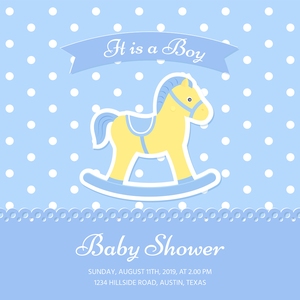
It’s a much bigger component of horse racing than many punters realise, but race horse breeding is a multi-million pound business. But how does it work, why is it so expensive, and which horses make the best sires?
Here, we explain everything you have ever wanted to know about what horses get up to behind closed doors but were too embarrassed to ask.
Shortest Horse Races
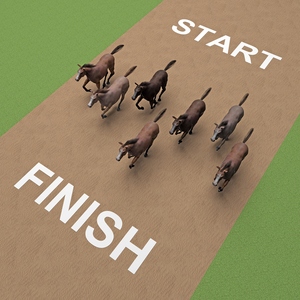
Races run over the shortest distances are known as sprints, and they are designed for a particular type of horse. There are plenty of them in the UK and elsewhere too, but there are some that are so short they barely seem worth running at all. Read all about them here.
Horse Racing Winnings - How Are They Split

Horse Racing is the second most popular sport to bet on after football but yet few people think about how much money is made by owners, jockeys and trainers.
On this page we look at how racing winnings are divided and who gets the lions share. We look at how important winnings are to jockeys and trainers.
How Does A Horse Falling Affect Its Next Races?
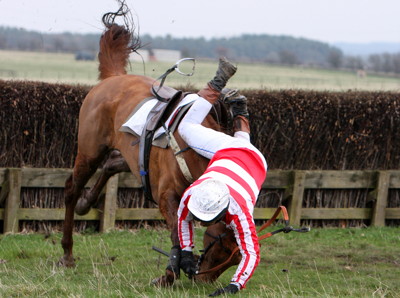
In jump racing horses have to jump obstacles that are taller than most people and so falling in races happens to almost every jump racer over time.
It can be frustrating if you backed the horse that fell but it is worth backing again? How do horses that fall perform in the races that follow, does falling have a negative impact on performance?
How to Read a Race Card

Horse racing can be deliberately complicated, there are all sorts of numbers and abbreviations in the sport to represent data and these are presented on a race card. To the uninitiated these numbers can be meaningless but in reality they are fairly simple to understand. Racing can look complicated but it isn't, they just represent data differently than in other sports.
Using a race card can help punters make more informed decisions on how to bet and it can also give you more enjoyment of the race as you understand more how it might play out. Have a look at our guide for the basics on how to read a race card.
How Often do Less Than 6 Horses Run in a Race?

A race with too few runners is not an entertaining race to watch, or a race that it is easy to find a value bet for.
Sadly, small fields are on the rise in UK racing, especially when it comes to jump racing, and fields of under 6 runners are almost at the 1 in 5 ratio.
This is damaging to the racing industry, but why is it happening, and is there anything that can be done to turn things around?
Average Attendances at Horse Races

The number of racegoers at the racecourse has been falling, and in 2022, the total number dipped below 5 million for the first time in over 25 years.
A global pandemic and a cost of living crisis haven't helped matters, but are things as bad as people say, or is there a glimmer of hope on the horizon?
Here we look at the average number of attendees at an average race meeting, as well as diving into how the actual figures have changed from one year to the next.
Average Bookmaker Margin on Horse Racing

The margin a bookie builds into their prices is how they make their money, but it is also an indication to the punter of whether or not the bet holds value - if they go to the effort of working it out of course.
This isn't the only way to find value of course, but a lower margin means fairer odds.
How has the margin changed over time in horse racing, and what is the average we can expect across the industry?
Average Prize Purse

Money makes the world go round, and it makes the horse racing industry run too. Prize money is what owners and trainers turn up to meetings for, and it's what this article is about too.
The average prize purse per race in Britain is steadily on the increase, but that's not quite the whole story, and despite flat racing seeming to pay more on average than jumps, on a race by race basis the truth can be much less clear.
Outside of prestige races, British racing has struggled with small purses for a long time, and this is clear when looking at the average purse per race for jumps and flat racing, especially once you realise how it is split up and shared around.
How Many Horses are Non-Runners?

A non-runner can be very disappointing as a punter, but from the trainer's point of view, you just can't gamble on the health and safety of your horse.
Non-runners are unavoidable in horse racing as things can change overnight with these very sensitive animals, but nevertheless, in an ideal world they would be kept to an absolute minimum.
The average number of non runners obviously changes from one year to the next, but there have been periods where this number has risen to problematic levels, and the BHA has had to step in.
Regions with the Most Horse Racing

With horse racing, there is a lot of luck involved for everyone who takes an interest in the sport, professionally or recreationally. Luck of the breed, luck on the day, luck in the betting shop - yes, we can do our best with research etc, but luck still comes into it.
Well it seems that luck even plays a role in deciding how easy it is for racing fans to enjoy the sport live as well, because the fact is, where you live will either help or hinder when it comes to getting to your local racecourse.
Some regions in the UK have lots of racecourses, others have none, and for punters who want to watch the races live and soak up the atmosphere, that can make things difficult. Some regions simply have more horse racing than others, and you can find out which ones here.
Have Bookmakers Reduced Margin on Horse Racing Since Covid?

Covid had a hugely detrimental impact on the economic state of the country, and whenever the economy takes a hit, bookies tend to reduce margins to keep betting looking attractive to punters.
Covid was no different, but it came at the same time as a few other financial issues.
Bookies margins on horse racing did certainly drop since the pandemic, but does Covid alone explain the all time lows we were seeing at that time?
Average Starting Price of the Favourite

The starting price is the odds a horse ends up at at the time the race begins. It starts by the bookie releasing odds ante post, and then those odds move depending on how heavily backed the horse is or isn't in relation to all of the other runners.
The favourite is obviously the horse with the shortest odds, but what looks short in one race can be very different to what looks short in another, and there is also a consistent gap between the average favourite SP in flat and jumps racing.
This article explores data from the British Horse Racing Authority that shows a downward trend in the starting price of favourites, and also looks into why it might be happening.
How Many Horse Races Have Odds on Favourites?

An odds on favourite is a clear sign that the bookies and the punters alike think one horse in particular has the race in the bag, and although this might not always come to be, it has meaning.
Short odds aren't exactly eye catching for punters looking for big value. Yes, they are sometimes the right call, but the shorter the odds get the less point there is taking them, forcing punters to ignore the race or look at other betting lines such as betting without, for example.
If short odds favourites were too common, therefore, the horse racing world would be a much less exciting place, and that leads me on to the question in hand; just how often do horse race have an odds on favourite?
What is the Most Common Going?

The going is an important aspect of horse racing for anyone wanting to make a bet, because it can have an impact on how each individual horse might perform.
The going in the UK has been slowly but steadily changing over time, with many different factors at play, but there is a definite trend away from one end of the scale and towards the other.
That said, throughout all of this change, there has been one specific type of going that has remained fairly consistent, and can certainly be regarded as the most common in horse racing.
How Many Races Have 8 or More Runners?

The average number of runners in horse racing is not as high as it once was, and although races with too many horses taking part would be too difficult to predict, it is equally true that races with two few horses taking part are too easy to predict.
This has a big impact on odds value, prize money, and the amount of betting activity that takes place from one race to the other, so it is an important issue for the industry.
In this article, I look into how many horse races hit the sweet spot of 8 runners or more, how this has changed, and why.
How Many Horse Races Take Place Each Year in the UK?

Racing is available pretty much every day, so it might feel like there is no shortage of it, but in fact, the number of races held in the UK each year has started to fall away.
Oddly enough, this has likely been done on purpose.
You might think that a decline in the number of horse races each year would signal bad news for the industry, but in this case, the exact opposite could be true. If fewer races are held but the same number of horses are racing, that could improve field sizes and everything else builds from that.
